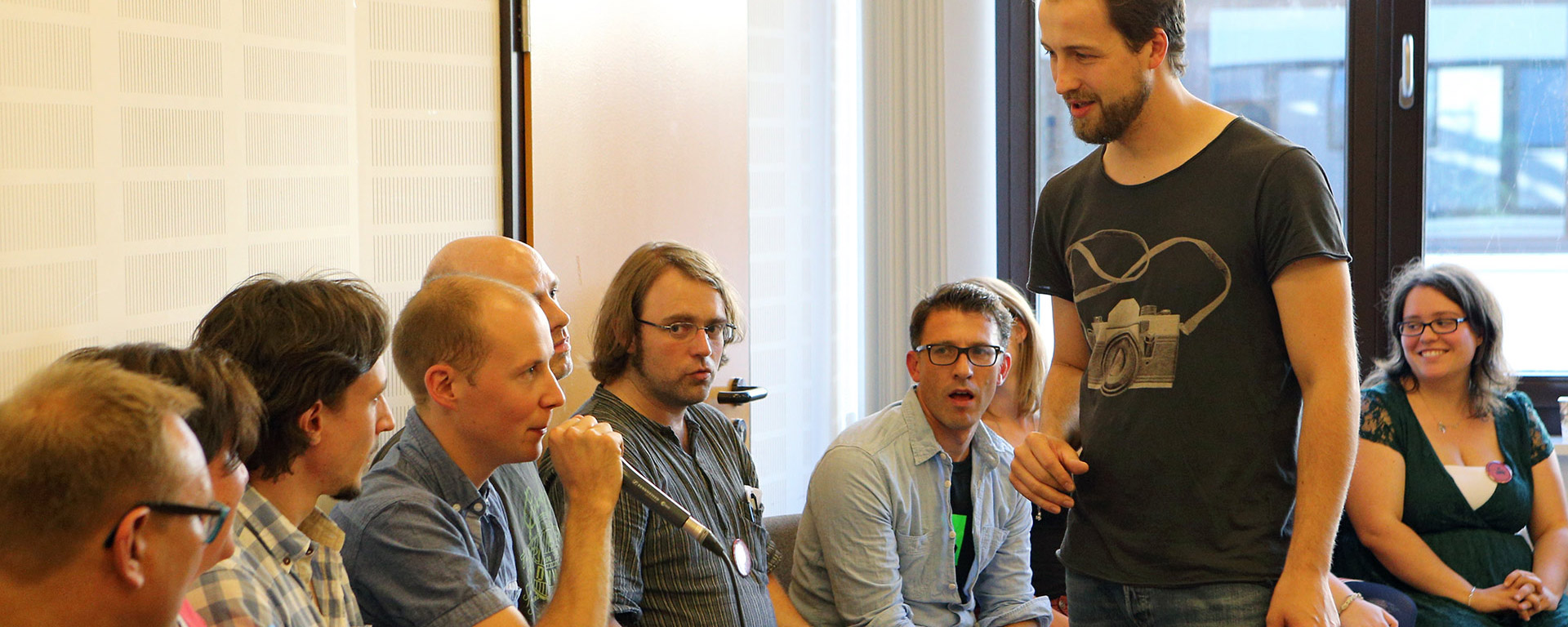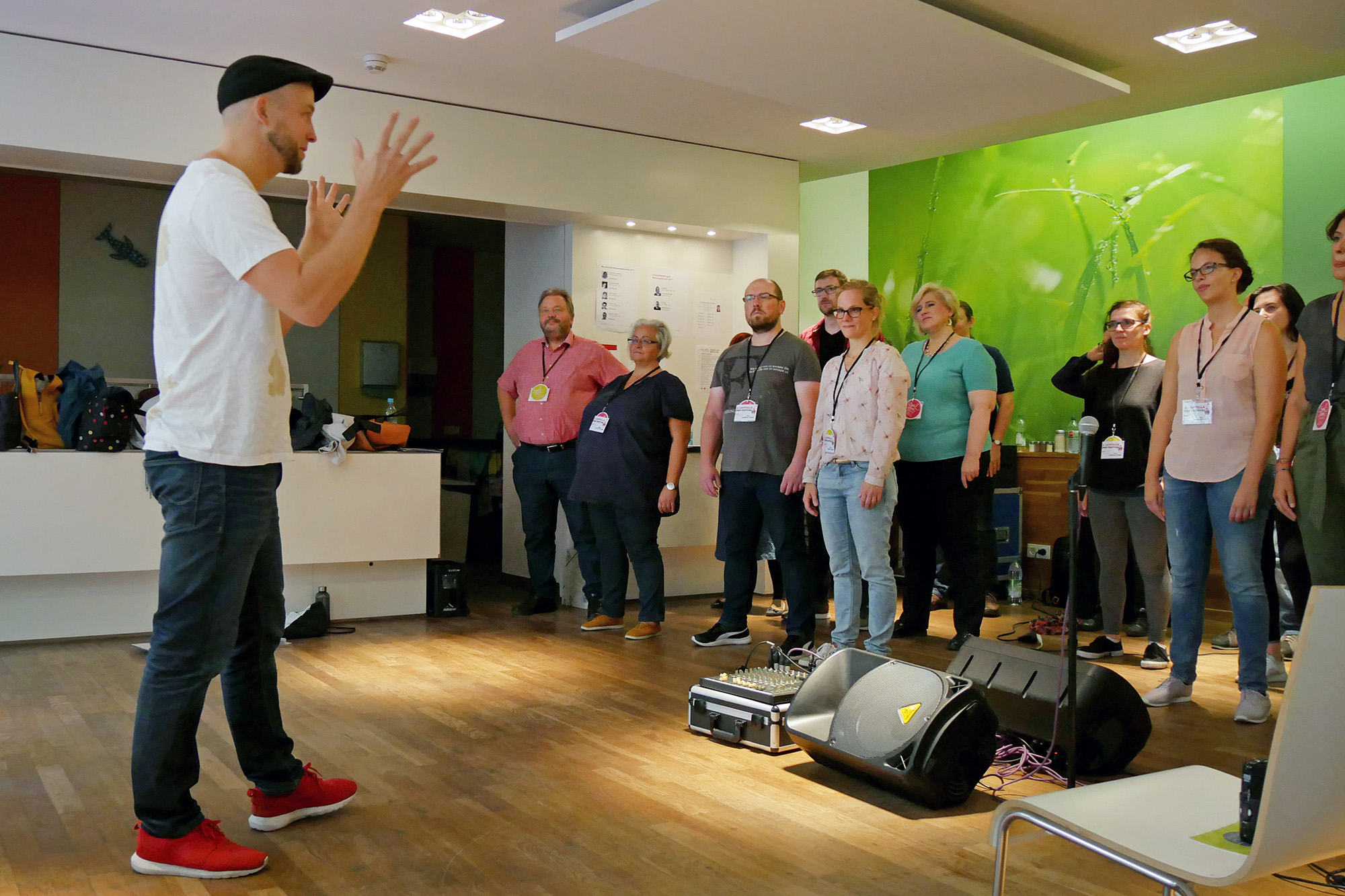Have any questions?
+44 1234 567 890
I’m happy to pass on what I’ve picked up so far, even if I don’t yet have a fully developed concept. What I have already brought to people in the past are workshops with these great-sounding titles:
Beatbox for beginners
Beatboxing has been part of youth culture for several years and is equally fascinating for older people. In his workshops, Lukas Teske teaches the basics of vocal percussion in a playful way.
- How do I produce drum sounds such as a snare, bass drum or hihat with my mouth?
- How can a microphone make beatboxing easier?
- How do I develop a great rhythm?
- How do I beatbox drum scores?
With games, improvisation and songs, the basics are learnt on the fly and the participants are given the tools to practise and develop the acquired knowledge on their own.
No restriction on participants.
Knowledge of sheet music is desirable, but not a prerequisite.
Beatbox for the advanced
Do “Dum ze ka ze” and “Pf te Bsch” mean anything to you? Can you think up rhythms and put them into practice? Great, then come and see Lukas Teske! Your specific questions will be answered, new sounds and breathing techniques will be introduced, styles and grooves will be tried out. Other focal points will be strategies for practising, handling the microphone and, if required, the basics of mixing. With a little hard work, you'll soon have the Inward Rim or the Lip Bass in your repertoire.
An important aspect is the exchange and technical analysis of the participants, so prior knowledge is essential. Unfortunately, attending the beginners' workshop the day before is not enough.
Maximum of 10 people.
Knowledge of sheet music is desirable, but not a prerequisite.
Beatboxing for children
The roots of all musicality lie in childhood. Whether a child is learning the guitar, oboe, singing or just wants to be cool, beatboxing helps. In the 45–60 minute workshop by “Hartmuth und die Hitmaschine”, the sense of rhythm is trained with small, exciting grooves, special beatbox sounds are taught and, above all, instructions are given on how the children can continue, it if they want to.
Easy rhythm games keep the time short and blur the boundaries between cool hip-hopper and choir singer.
Concert presentation
How do I announce my ensemble/choir? How do I bring the evening to life? How do I win over an audience away from the music? How much do I have to talk, how much can I talk? Do I speak freely or plan the evening with index cards? How do I deal with stage fright?
These are all tasks that are often neglected in concert preparation, but good moderation can significantly improve the perception of a concert evening and even make unpopular literature accessible. Making the funny even funnier, taking the unnecessary edge off the serious. The workshop is aimed equally at choir singers as well as conductors or ensemble leaders, in other words anyone who wants to cut a good figure on stage alongside the music.
Vocal Producing & Editing for Starters
My journey from the first recording to the finished mix
So, the song is rehearsed, the notes are right, the musicians sound together. Awesome. Now the thing has to be preserved in the best possible way. This is where Lukas’ workshop begins.
- How do I record the voices?
- What do I use as a recording basis (playback, guide)?
- In which order should I record?
- How do I edit the tracks (selection, cut, Melodyne/Autotune)?
- How do I mix the tracks together (compression, EQing, balance, reverb, etc.)?
The focus is on working in the DAW (Logic, Cubase, ProTools, Luna, Ableton, Reaper etc.).
The subject is incredibly complex and impossible to cover perfectly. Lukas tries to pick everyone up, get them interested and get them on track.
Happy DIYing.
Online review:


